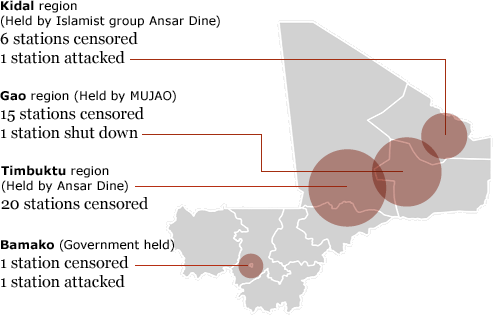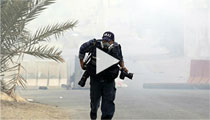After an extended period of relative calm and freedom, the Malian press faced severe threats amid a military coup and an armed insurrection. In March, a junta ousted President Amadou Toumani Touré just weeks before his second and final term would have expired. Touré had been the target of public discontent over setbacks suffered by the army in its fight against ethnic Tuareg separatists of the National Movement for the Liberation of Azawad in Mali’s Saharan north. The rebels allied with hard-line Islamist militants to take advantage of the political turmoil after the coup, seizing Timbuktu and other northern cities and towns. Islamist groups imposed draconian censorship on dozens of radio stations, and shut down at least one. Their orders included bans on music and demands that programming feature Quranic recitations, local journalists said. Journalists operating in rebel and Islamist-controlled areas were also subjected to intense intimidation; those in government-controlled areas faced kidnappings, detentions, and assaults.
Mali
» Junta-led government detains, intimidates press in the south.
» Rebels, militants impose strict censorship in the north.
After an extended period of relative calm and freedom, the Malian press faced severe threats amid a military coup and an armed insurrection. In March, a junta ousted President Amadou Toumani Touré just weeks before his second and final term would have expired. Touré had been the target of public discontent over setbacks suffered by the army in its fight against ethnic Tuareg separatists of the National Movement for the Liberation of Azawad in Mali’s Saharan north. The rebels allied with hard-line Islamist militants to take advantage of the political turmoil after the coup, seizing Timbuktu and other northern cities and towns. Islamist groups imposed draconian censorship on dozens of radio stations, and shut down at least one. Their orders included bans on music and demands that programming feature Quranic recitations, local journalists said. Journalists operating in rebel and Islamist-controlled areas were also subjected to intense intimidation; those in government-controlled areas faced kidnappings, detentions, and assaults.
-
62
Anti-press violations -
74%
Abuses by militants, rebels -
45
Stations censored, attacked -
12
Detentions
CPJ documented numerous assaults, detentions, abductions, threats, and instances of censorship after the March 22 coup. No anti-press attacks had been reported between 2008 and 2011, and just four had been documented in 2007.
Tuareg separatists and Islamist militants were responsible for 46 of 62 anti-press abuses documented by CPJ.
| 26 | Ansar Dine |
| 14 | Movement for Oneness and Jihad in West Africa, or MUJAO |
| 6 | National Movement for the Liberation of Azawad, or MNLA |
Salafist militants with Ansar Dine and the Movement for Oneness and Jihad in West Africa (MUJAO) were responsible for most radio station censorship, according to CPJ research. They banned music and entertainment programs on the air, dictated coverage, and forced the station to adhere to Islamic-oriented broadcasts. Journalists were subjected to pre-publication censorship.

Several journalists were detained by security forces in the capital, Bamako, according to CPJ research. The journalists were interrogated over articles critical of the government and released without charge. Most were held briefly, although one, Habi Baby, editor of Caravane, was held for a week.
March 28, 2012: | Omar Ouahmane, reporter for Radio France |
March 29, 2012: | Five journalists for The Associated Press |
May 12, 2012: | Biram Fall, editor of Le Prétoire |
May 15, 2012: | Saouti Labass Haïdara, editor of L'Indépendant |
June 12, 2012: | Habi Baby, editor of Caravane |
November 15, 2012: | Moctar Barry, reporter for Droit Libre TV |
December 1, 2012: | Fadoul Abderazak and Salihu Awalu of Al-Jazeera |

